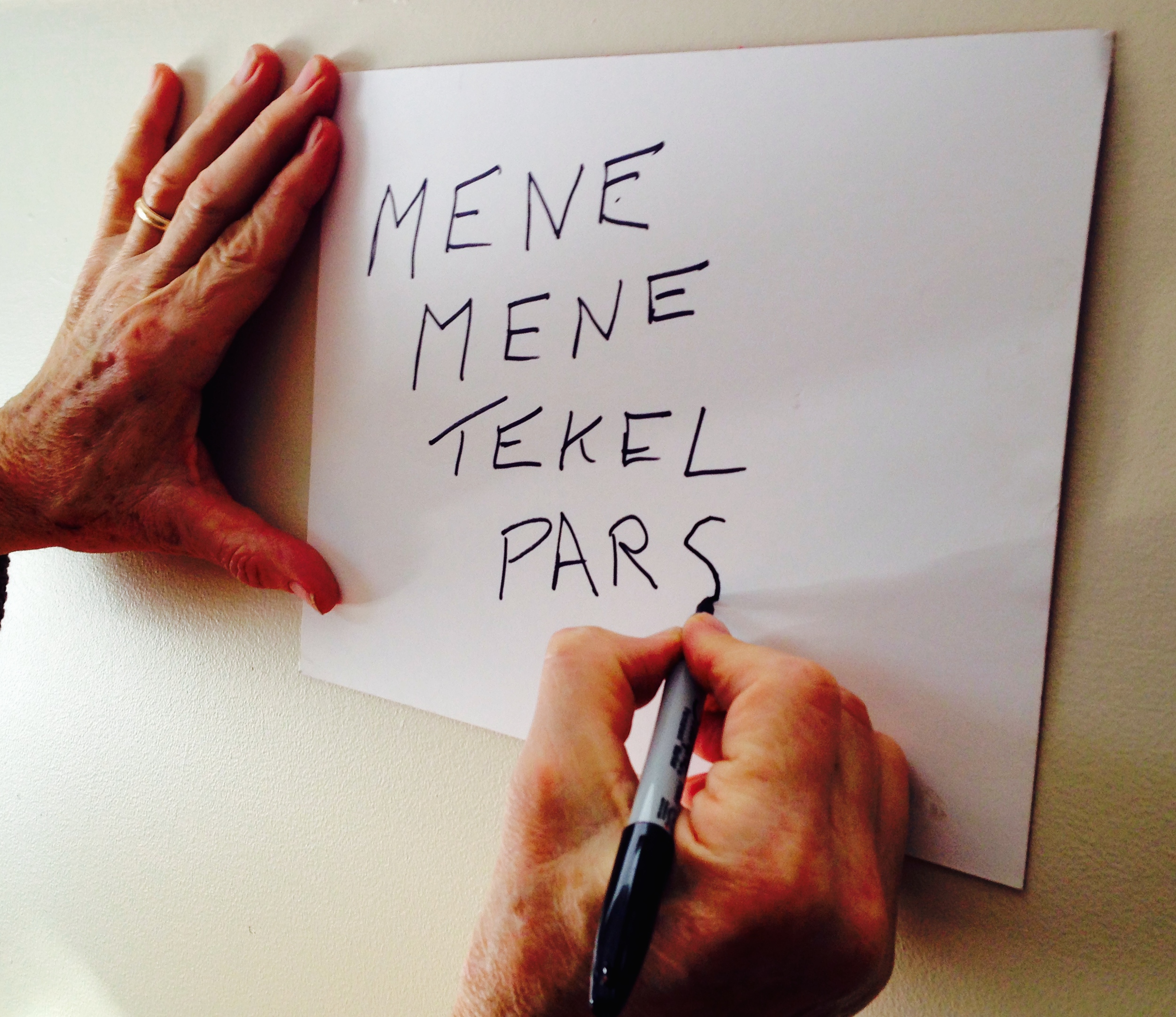King Belshazzar’s Mother: The Handwriting on the Wall

Who knew that these words—”The handwriting is on the wall”—center around the last woman to be quoted in the Old Testament? We hear the phrase in boardrooms, schoolrooms and church meetings. Who knew it even came from the Bible…much less a very wise woman? (Ah, of course…you might be thinking). See Daniel, chapter 5, for the complete text. Here’s a visual guide:
Picture the curtain opening in the year 539 B.C.E:
…Belshazzar, king of Babylon and son of Nebuchadnezzar, is in the midst of a bawdy and raucous party in Babylon, surrounded by a thousand of his lords, his wives and his concubines.
Under the influence of much wine, great feats of Babylon are toasted, including what many considered one of its finest moments: laying siege to Jerusalem in 597 BCE, destroying King Solomon’s temple, and plundering its many treasures.
“Bring in the chalices,” orders Belshazzar. “Let us drink from the cups of our enemies!”
A hand emerges
Praising the gods of gold and silver, bronze and iron, wood and stone, the partygoers lift the sacred vessels to their lips. And immediately, a hand seems to emerge from a dark corner of the room, writing on the wall with long and elegant strokes. With his knees knocking and his face growing pale, Belshazzar is terrified, unable to understand the mysterious writing.
“Bring in the magicians,” he cries. “Bring in the wise men! Get anyone who can read this writing and tell me what it means!”
“Ahem! Ahem!” Ponder, grunt, mumble. The seers are unable to tell the king the meaning of the foreign words.
And then the door to the banquet hall opens, allowing the king’s mother to sweep in, as only queen mothers do. She begs her son to call on Daniel, the faithful Jewish visionary who had guided her husband, King Nebuchadnezzar, through many trials, including hallucinations, dreams and insanity.
Daniel, now an old man, is found. Grimacing, he reads the words on the wall, “MENE, MENE, TEKEL, and PARSIN.” (Read it for yourself: Many, many, tek-el, ha parson.)
“God has numbered the days of your kingdom,” he translates. “You have been weighed on the scales and found wanting, and your kingdom will be divided between the Medes and the Persians.”
That very night, Belshazzar is killed, and half the kingdom is given to Darius the Mede.
Consider this
Mothers are often the keepers of history. Belshazzar’s mother remembered that Daniel had given the king a sense of order and God’s presence through his difficult trials. She had seen Daniel and his friends walk through flames and not be burned; she had seen hungry lions lay down before him when he was thrown to them for food. She knew he was a holy man, one of God’s people, and like most mothers, she wanted the best for her son.
Alas, it was too late. Belshazzar had made a fatal mistake, despite his mother’s advice.
She discovered what so many parents sadly find out: the actions of their grown children are no longer under their control. Most mothers raise their children with the best of intentions, devoting their heart and soul to their offspring. Yet sometimes, children take another path. Some make the wrong decision and break the law. Others engage in bad habits. And still others are killed or harmed through no fault of their own.
Only parents who have lost a child can rightfully know the depth of pain that a mother or father feels in such an instance. Unfortunately, Belshazzar’s mother was witness to a triple nightmare: the handwriting on the wall, Daniel’s ensuing prophecy, and the death of her son.
What might we learn from King Belshazzar’s mother?
- Decisions made by grown children are theirs alone, yet the old adage is often true—sometimes mothers do know best.
- Sometimes people from the past DO have the answers.
- It is good to seek advice, especially when things are out of control.
- Mothers (and fathers) are the keepers of
- When all is chaos, God is still present.
Adapted from Bible Women: All Their Words and Why They Matter, published by Forward Movement, 2014.

